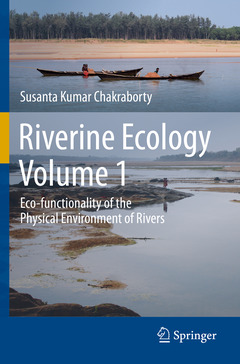Riverine Ecology Volume 1, 1st ed. 2021 Eco-functionality of the Physical Environment of Rivers
Auteur : Chakraborty Susanta Kumar

This book is part of a two-volume set that offers an innovative approach towards developing methods and tools for assigning conservation categories of threatened taxa and their conservation strategies by way of different phases of eco-restoration in the context of freshwater river systems of tropical bio-geographic zones. The set provides a considerable volume of research on the biodiversity component of river ecosystems, seasonal dynamics of physical chemical parameters, geo-hydrological properties, types, sources and modes of action of different types of pollution, river restoration strategies and methodologies for the ongoing ecological changes of river ecosystems.
Volume 1 provides an in-depth analysis of different theories with international relevance pertaining to the functioning of river ecosystems, shaping their structure and contributing ecological services, and includes the principles of riverine ecology such as biogeochemical cycles, physiography, hydrogeology, and physico-chemical parameters. It covers the basic concepts and principles of water within riverine ecosystems, and the underlying ecological principles operating to ensure ecological stability and sustainability of the fluvial ecosystem. The book explains the ecofunctionality of different geo-morphological, geo-hydrological and physico-chemical factors and processes in changing time scales and spaces, with special emphasis on the tropical fresh water rivers in India.
Dr. Susanta Kumar Chakraborty is Professor of Zoology at Vidyasagar University and he received his M.Phil. in Environmental Science and Ph.D. in Marine Science from Calcutta University. His research centers on Coastal Ecology, Mangrove and Fresh Water Wetlands, Rivers and Estuaries, emphasising biodiversity and ecosystem dynamics. He has also worked on the integration of rural bio-technologies for environmental management, eco-restoration, and livelihood generation. He has received a number of awards in recognition of his research commitments. Dr. Chakraborty has taught for over three decades, mostly in the postgraduate level, covering different aspects of Zoology in general and Ecology/Environmental Science in particular, and has successfully supervised thirty Ph.D. students, published around 150 research papers, written books, and has completed more than a dozen research projects including consultancy work on environmental impact assessment in several countries. Dr. Chakraborty has also served at other universities as a member of selection committees and academic bodies, as well as an expert member in several government departments like U.G.C. and I.C.A.R., and he is a life member of a number of scientific bodies in India and serves on the editorial board of a number of journals.
Fills a bibliographic gap in river ecology in tropical locations
Provides information on sustainable water management, monitoring and remedial measures
Discusses the functionality and physico-chemical parameters of river ecosystems
Date de parution : 03-2022
Ouvrage de 566 p.
15.5x23.5 cm
Date de parution : 03-2021
Ouvrage de 566 p.
15.5x23.5 cm



